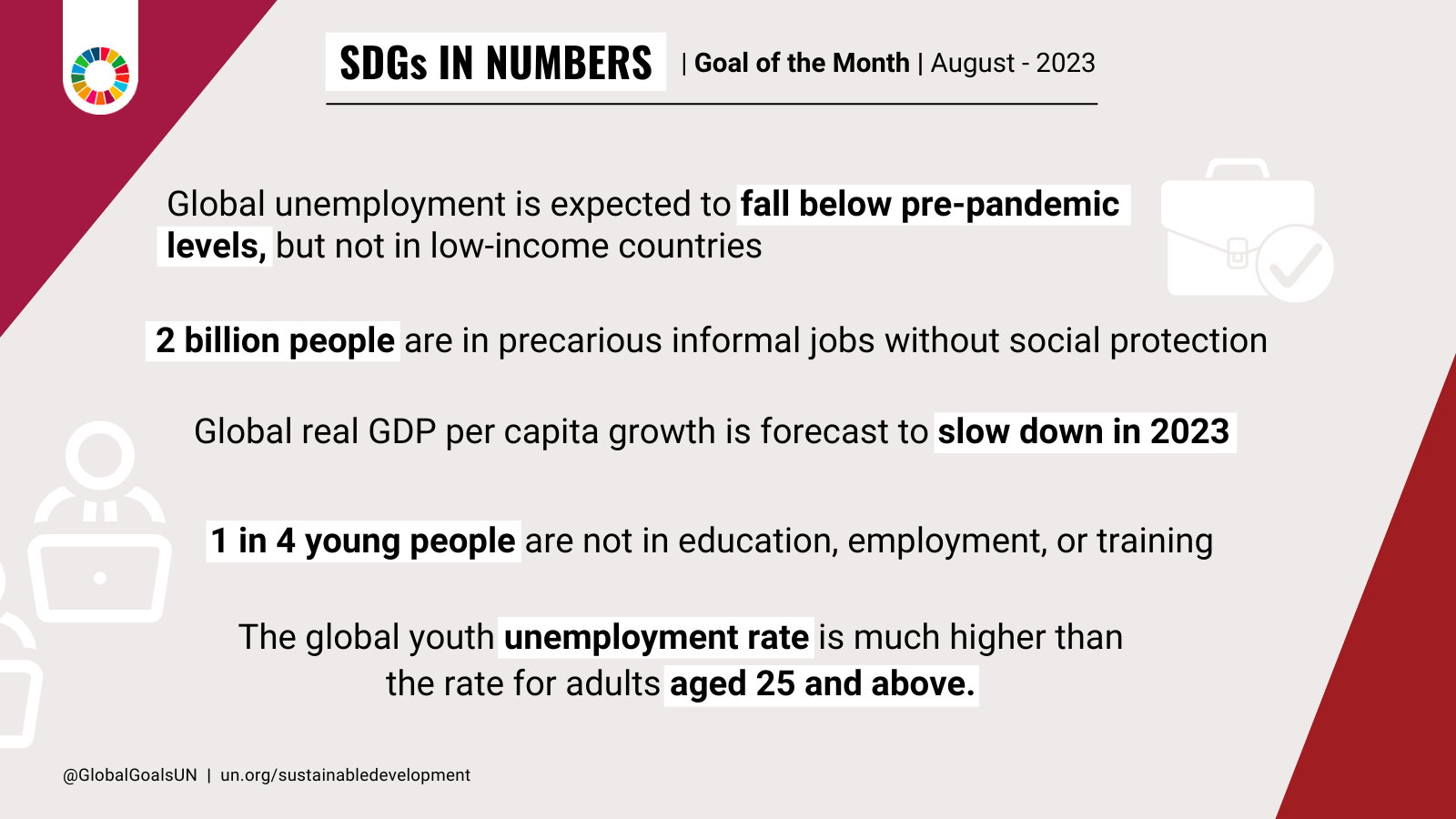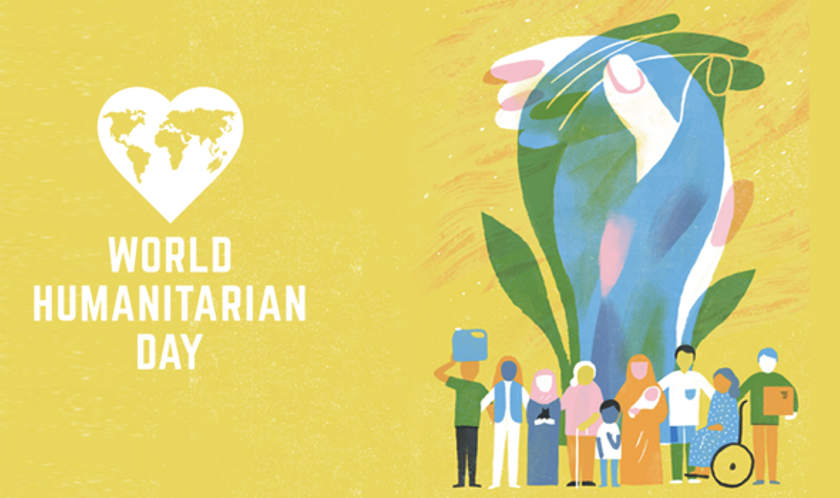Sustainable Development Goal 8 is about promoting inclusive and sustainable economic growth, employment, and decent work for all. The COVID-19 pandemic caused the worst economic crisis in decades and reversed progress on key issues related to decent work for all. While global economies have slowly bounced back since 2021, recovery still remains elusive and fragile, especially around employment improvement and availability for all.
Where are we?
As we reach the midpoint review of the 2030 Agenda, it is clear that multiple crises are placing tremendous pressure on the 17 Sustainable Development Goals. According to the 2023 UN World Economic Situations and Prospect Report (WESP), growth momentum weakened in the United States, European Union, and other developed economies, causing rippling effects on the rest of the world. World output growth is projected to decelerate from an estimated 3.0 percent in 2022 to 1.9 percent in 2023, marking one of the lowest growth rates in recent decades. Growth in real GDP per capita went from an average annual rate of 1.8 percent from 2015 to 2019, to a sharp decline of 4.1 percent in 2020. While it slowly increased by 5.2 percent in 2022, it is estimated that growth in 2023 will still be slower, falling short of the SDG target of 7 percent.

Global employment opportunities have also been highly impacted, with key issues for women and youth. The UN Secretary General’s 2023 SDGs Report: Special Edition highlights that unemployment rates significantly declined in 2022, with an estimated total global unemployment of 192 million. Furthermore, according to WESP, job recovery in developing countries has been slower with rates notably higher than before the pandemic. Additional factors, such as impacts from climate change, have also created obstacles for countries trying to achieve productive employment and decent work for all. Learn more from this week’s interview on heatwaves and work environments.
Global employment opportunities have also been highly impacted, with key issues for women and youth. The UN Secretary General’s 2023 SDGs Report: Special Edition highlights that unemployment rates significantly declined in 2022, with an estimated total global unemployment of 192 million. Furthermore, according to WESP, job recovery in developing countries has been slower with rates notably higher than before the pandemic.
Further declines are expected in 2023, but the youth unemployment rate continues to be higher than the rate for adults, highlighting the ongoing challenges in securing opportunities for young people. The pandemic disproportionately affected women and young people in the labor market, and while some recovery was seen, young people aged 15-24 still face difficulties in securing decent employment. Moreover, many young people, especially young women, were not in education, employment, or training in 2022. This is predominant in areas like Central, Southern, and Western Asia and Northern Africa.
To ensure the achievement of SDG 8, we need a financial system that not only tackles issues of rising debt and economic uncertainty but also focuses on promoting equitable pay and decent work for all young people.
In Focus
Impacts of climate change on SDG 8 – UN News

Increasing temperatures across the world continue to threaten the environment. July 2023 was recorded as the hottest month ever, according to recent reports from WMO. But increasing temperatures can also cause major issues with safe working conditions and can severely impact the achievement of several SDG 8 goals.
A recent report from the International Labour Organization highlighted the critical issues around heat stress on decent work, economic growth, and labor productivity. New and recurring heat waves can make work situations difficult by increasing the risk of injuries and heat-related illnesses. Learn more about the impacts of heatwaves on work environments in the interview below.
INTERVIEW: Heatwaves endanger workers and reduce productivity
Celebrating youth as agents of change

Youth movements around the globe have brought to the world’s attention the importance of listening and working with young people to tackle the various crises we’re facing today. Despite being uniquely vulnerable to the various crises our world is currently facing, young people have repeatedly shown resilience and demonstrated that they are crucial players in shaping a more sustainable world.
During the ECOSOC Youth Forum in April 2023, the UN’s Secretary General launched a policy brief on meaningful youth engagement in policymaking and decision-making processes, highlighting key proposals with a view towards ensuring more meaningful, diverse, and effective youth participation across intergovernmental decision-making processes at all levels. Young people undoubtedly remain one of our greatest hopes to achieve the SDGs, ensuring no one is left behind with their innovative solutions and perseverance.
Now is the time to get the world back on track and young people can play a key role in this. In the lead-up to the SDG Summit, the UN’s Office of the Secretary-General’s Envoy on Youth will be facilitating youth-led consultations to inform and raise awareness of the SDG Summit and gather recommendations and ideas on meaningful youth engagement and the 2030 Agenda. Additional details on participation and registration can be found here.
International Youth Day (12 August)

To mark International Youth Day this year, the Office of the Secretary-General’s Envoy on Youth will run a month-long campaign focused on showcasing young people’s resilience, resourcefulness, and leadership when it comes to creating a better world for all.
Under the theme of “Celebrating Ways #YouthLead as Agents of Change for the Global Goals”, the Office will hand over its digital channels (social media, website, email) to a different young person each day throughout the month of August, culminating in a first-of-its-kind month-long takeover showcasing the myriad of intersectional ways that young people are contributing to the achievement of the SDGs around the world.
The youth-led takeover will kick off on 1 August on all @UNYouthEnvoy channels (Twitter, Facebook, Instagram, and TikTok). A “Youth Live” broadcast featuring the 17 Young Leaders for the SDGs, in collaboration with Peace One Day, will be streamed virtually on 12 August across @UNYouthEnvoy channels.
Learn more here on how to participate in the takeover and spread the word to your communities.
Youth Advisory Group – Giving young people a voice

Given that young people face particular challenges in exercising their rights while often being at the forefront of human rights activism, youth engagement is a key component of the Human Rights 75 initiative, celebrating the 75th anniversary of the Universal Declaration of Human Rights (UDHR). The Youth Advisory Group consists of twelve inspiring young activists from around the world who will help ensure youth voices are heard. In the lead-up to the International Youth Day on 12 August, help amplify their voices by sharing the assets here.
Key Upcoming Moments
SDG Summit (18-19 September)

The United Nations will convene the SDG Summit on 18-19 September 2023 at its Headquarters in New York, during the General Assembly high-level week. With the 2030 Agenda for Sustainable Development at the midpoint, world leaders will carry out a comprehensive review of the state of the 17 Sustainable Development Goals (SDGs), respond to the impact of multiple and interlocking crises facing the world, and provide high-level political guidance on transformative and accelerated actions towards the target year of 2030.
For the first time in decades, development progress is reversing under the combined impacts of climate disasters, conflict, economic downturn, and lingering COVID-19 effects. The SDG Summit will be a rallying cry to recharge momentum, for world leaders to come together, to reflect on where we stand, and resolve to do more. It is a moment to recommit to a vision of the future that ensures no one is left behind.
For additional details on programming, media resources, solutions stories, and more, please find relevant resources below:
- SDG Summit Aggregate page: https://www.un.org/sustainabledevelopment/blog/2023/05/un-2023-sdg-summit/
- SDG Summit Programme: https://www.un.org/en/conferences/SDGSummit2023
SDG Summit Action Weekend (16 – 17 September)
The United Nations is convening an SDG Action Weekend on 16-17 September 2023 which will consist of the SDG Mobilization Day on Saturday, 16 September, and the SDG Acceleration Day on Sunday, 17 September, at United Nations Headquarters in New York. From civil society, scientists, local and regional governments, to youth, this weekend is an opportunity to generate additional opportunities for engagement across all actors, from civil society
The SDG Mobilization Day (16 September) will create an opportunity for stakeholders from all sectors to convene inside the United Nations Headquarters and mobilize towards an ambitious SDG Summit and UN General Assembly High-Level Week. The SDG Acceleration Day (17 September) will be centered around the UN High-Impact Initiatives. Youth will play a key role during this weekend with specific side events and discussions to address key issues and solutions for the SDGs.
For details on the weekend, including registration and program, please check the below link:
https://www.un.org/en/conferences/SDGSummit2023/SDG-Action-Weekend
Also Coming Up
International Day of Indigenous People (9 August)

International Day of Indigenous People takes place every year on 9 August. Indigenous people are less than 5 percent of the world’s population but account for 15 percent of the poorest, and more than 86% of indigenous peoples globally work in the informal economy, compared to 66% of their non-indigenous counterparts, making awareness of these populations vital in the road to achieving SDG 8.
This year’s international Observance will take place online on Wednesday, 9 August 2023 from 9:00 am to 10:30 am EST. The theme will focus on Indigenous Youth as Agents of Change for Self-determination. Further details of the event are available here, including registration.
World Humanitarian Day (19 August)

The 19th of August marks a bomb attack on the Canal Hotel in Baghdad, Iraq in 2003. The attack killed 22 humanitarian aid workers, including the UN Special Representative of the Secretary-General for Iraq, Sergio Vieira de Mello. In 2008 – 5 years after the event, the United Nations General Assembly adopted the resolution which designated the 19th of August as World Humanitarian Day in appreciation of humanitarian work.
This day remains important to commemorate, as aid workers remain at risk while doing their jobs: In 2021, 460 aid workers were attacked: 140 killed, 203 wounded and 117 kidnapped. The role of humanitarian workers is key to achieving the SDGs and it is essential that we recognize this. Additional details can be found here.
International Day for Commemorating the Victims of Acts of Violence Based on Religion or Belief (22 August)
This International Day highlights the importance of supporting those who have been victims of acts of violence based on religion or belief. Freedom of religion or belief, freedom of opinion and expression, the right to peaceful assembly, and the right to freedom of association are enshrined in the Universal Declaration of Human Rights. However, acts of intolerance and violence based on these are increasing. To recognize the importance of combating these, the General Assembly adopted a resolution titled “International Day Commemorating the Victims of Acts of Violence Based on Religion or Belief” strongly condemning continuing violence and acts of terrorism targeting individuals, including persons belonging to religious minorities, on the basis of or in the name of religion or belief. Additional details can be found here.


